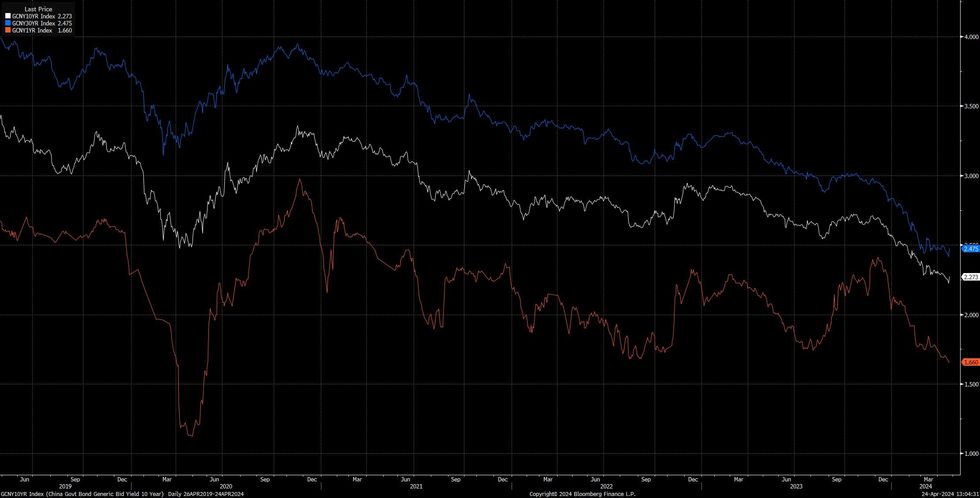-
Policy
Policy
Exclusive interviews with leading policymakers that convey the true policy message that impacts markets.
LATEST FROM POLICY: -
EM Policy
EM Policy
Exclusive interviews with leading policymakers that convey the true policy message that impacts markets.
LATEST FROM EM POLICY: -
G10 Markets
G10 Markets
Real-time insight on key fixed income and fx markets.
Launch MNI PodcastsFixed IncomeFI Markets AnalysisCentral Bank PreviewsFI PiFixed Income Technical AnalysisUS$ Credit Supply PipelineGilt Week AheadGlobal IssuanceEurozoneUKUSDeep DiveGlobal Issuance CalendarsEZ/UK Bond Auction CalendarEZ/UK T-bill Auction CalendarUS Treasury Auction CalendarPolitical RiskMNI Political Risk AnalysisMNI Political Risk - US Daily BriefMNI Political Risk - The week AheadElection Previews -
Emerging Markets
Emerging Markets
Real-time insight of emerging markets in CEMEA, Asia and LatAm region
-
Commodities
-
Credit
Credit
Real time insight of credit markets
-
Data
-
Global Macro
Global Macro
Actionable insight on monetary policy, balance sheet and inflation with focus on global issuance. Analysis on key political risk impacting the global markets.
Global MacroDM Central Bank PreviewsDM Central Bank ReviewsEM Central Bank PreviewsEM Central Bank ReviewsBalance Sheet AnalysisData AnalysisEurozone DataUK DataUS DataAPAC DataInflation InsightEmployment InsightGlobal IssuanceEurozoneUKUSDeep DiveGlobal Issuance Calendars EZ/UK Bond Auction Calendar EZ/UK T-bill Auction Calendar US Treasury Auction Calendar Global Macro Weekly -
About Us
To read the full story
Sign up now for free trial access to this content.
Please enter your details below.
Why MNI
MNI is the leading provider
of intelligence and analysis on the Global Fixed Income, Foreign Exchange and Energy markets. We use an innovative combination of real-time analysis, deep fundamental research and journalism to provide unique and actionable insights for traders and investors. Our "All signal, no noise" approach drives an intelligence service that is succinct and timely, which is highly regarded by our time constrained client base.Our Head Office is in London with offices in Chicago, Washington and Beijing, as well as an on the ground presence in other major financial centres across the world.
Real-time Actionable Insight
Get the latest on Central Bank Policy and FX & FI Markets to help inform both your strategic and tactical decision-making.
Free AccessGoldman Take Profit On Long CGB Trade Following Policymaker Comms Matching MNI Reports
Goldman Sachs view “active CGB trading as part of the PBOC's regular open market operation toolbox, rather than QE.”
- They suggest that active CGB trading may mean that “policymakers gain better control of market interest rates, and thus reduce the risk of unintended over-tightening/loosening of financial conditions.”
- They also believe “the upcoming acceleration of government bond issuance implies limited room for further decline in market rates in the near term.”
- The recent policymaker communique on this front shouldn't be a surprise to MNI subscribers. A recent exclusive from our Beijing team (published on April 11) noted that the PBoC will “continue to monitor the longer-dated Chinese government bond market, adding supply and control over leverage to help guide 10-Year CGB yields closer to the present 2.50% one-year MLF rate.”
- Goldman go on to flag that “paying front-end IRS would provide some protection against tighter front-end liquidity conditions due to the likely large volume of government bond supply in the coming months.”
- Finally, they take profit on their long 1-Year CGB trade recommendation for a potential gain of 60bps (entered on 10 November ‘23).
- This comes after CGB yields moved off cycle lows following Tuesday's comments from policymakers.
Fig. 1: China 1-, 10- & 30-Year Yields (%)
 Source: MNI - Market News/Bloomberg
Source: MNI - Market News/Bloomberg
To read the full story
Sign up now for free trial access to this content.
Please enter your details below.
Why MNI
MNI is the leading provider
of intelligence and analysis on the Global Fixed Income, Foreign Exchange and Energy markets. We use an innovative combination of real-time analysis, deep fundamental research and journalism to provide unique and actionable insights for traders and investors. Our "All signal, no noise" approach drives an intelligence service that is succinct and timely, which is highly regarded by our time constrained client base.Our Head Office is in London with offices in Chicago, Washington and Beijing, as well as an on the ground presence in other major financial centres across the world.
